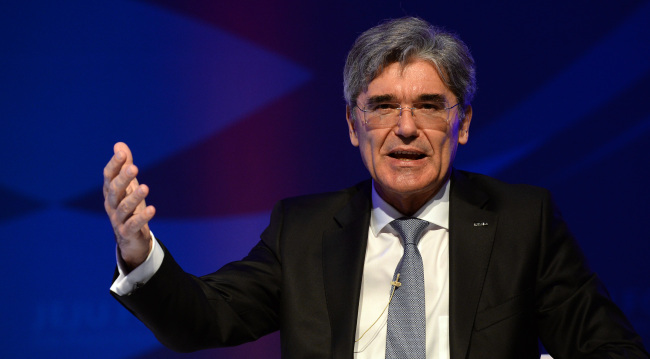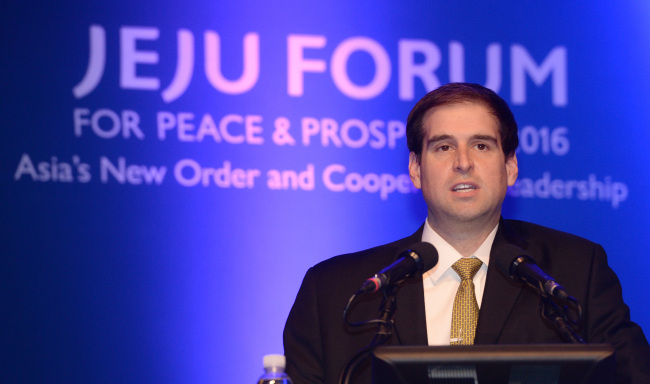JEJUDO ISLAND -- Enterprises can play a pivotal role in the potential reunification of the two Koreas that would be costly but would have great consequences, Siemens AG president and CEO Joe Kaeser said Friday.
“Large West German enterprises like Siemens did their part. By June 1991, Siemens employed 20,000 people in what was previously East Germany,” the head of the German engineering conglomerate said at a special session on the last day of the 11th Jeju Forum for Peace and Prosperity in Jejudo Island.
The three-day forum that had gathered some 4,500 political and business leaders and professionals from some 60 countries wrapped up Friday.
 |
Siemens AG President and CEO Joe Kaeser (Ahn Hoon/The Korea Herald) |
While temporary economic growth came in the initial stages of Germany’s reunification, the wealthier Western Germany eventually had to shoulder a lot of financial burden.
“Structural changes needed to take place, 40 years of economic disaster could not be changed within 40 weeks,” Kaeser said.
Despite the possible setbacks of unifying with the economically unstable, communist country, he said Germany’s case proves the effort is worth it.
“Will there be friction, yes. Will it cost billions? Absolutely, Will it take generations? I guarantee you. But will it be worth the effort? Absolutely,” he said. “Because you will change the world, and history proves it.”
Kaeser also stressed the power of collaboration in a world of constant changes that calls for countries and companies to adapt in order to succeed.
“In (the) old days, innovation happened in cubicles. One genius writing down things. But today’s innovation is by collaboration, by working together,” he said, adding that adapting to this transition is important in taking the next step.
In another special session, Jeffrey Straubel, chief technology officer of Tesla Motors, emphasized the acquisition of sustainable, renewable energy as the future of industrial development.
 |
Jeffrey Straubel, chief technology officer and cofounder of Tesla Motors (Ahn Hoon/The Korea Herald) |
The cofounder of the U.S.-based company pointed out that pollution and the depletion of resources offset the continued use of fossil fuels.
He mentioned the popularity of Tesla’s recently revealed Model 3 electric car as a case that illustrates the demand for electric cars based on new technology and new energy sources.
He mentioned Tesla’s project in Kauai, Hawaii, that aims to replace 50 percent of its energy with solar-generated energy by the year 2020.
“Technologically it is very exciting, but another amazing thing is that all of this can happen at far cheaper prices (then conventional fuels). The vision is: why not scale this up even more?” he said. “The tech exists to start to attack these problems. Just 10 years ago, we didn’t have solar that can be price competitive with fossil fuels.”
In a discussion with Jejudo Island Gov. Won Hee-ryong, he said there was a great potential in the region’s plan to replace all gas-powered cars with electric vehicles by 2030.
The forum has also garnered extra attention this year with the attendance of U.N. Secretary-General Ban Ki-moon, who hinted at the possibility of his presidential bid.
By Yoon Min-sik and Sohn Ji-young (
minsikyoon@heraldcorp.com) (jys@heraldcorp.com">
minsikyoon@heraldcorp.com) (jys@heraldcorp.com)









